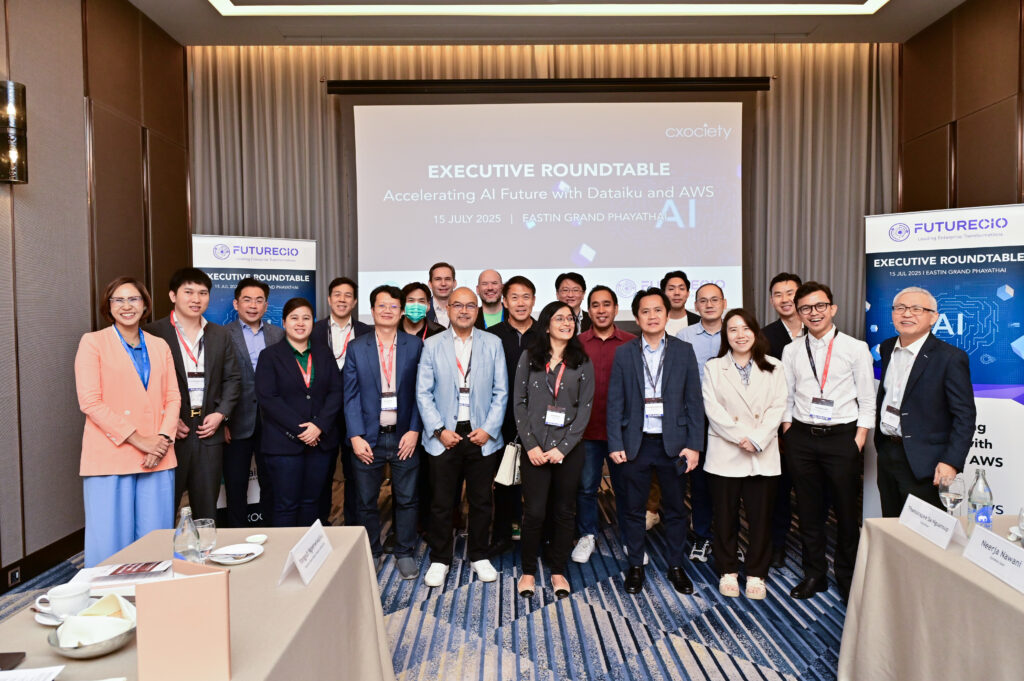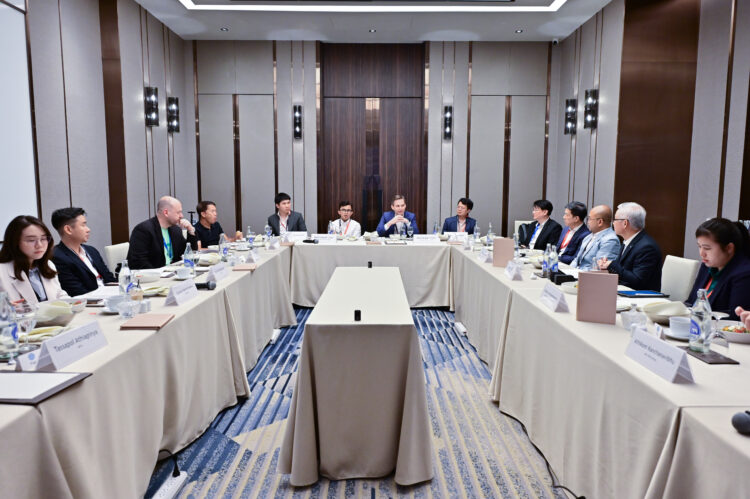As artificial intelligence transforms industries globally, Thai enterprises from across all sectors are grappling with how to harness AI's potential while navigating complex data challenges, integration hurdles, and organisational resistance.
The urgency is apparent: regional competitors are rapidly adopting AI, and the window for a competitive advantage is narrowing.
At the FutureCIO roundtable discussion titled "Accelerating the AI Future with Dataiku and AWS," senior technology leaders from Thailand's most prominent corporations revealed both the promise and perils of AI implementation.
Their experiences offer crucial insights into the realities of AI transformation in Southeast Asia's second-largest economy, where legacy systems meet cutting-edge ambitions and traditional business models confront digital disruption.
Trending: From experimentation to production
Thailand's AI journey reflects a familiar pattern across emerging markets: high enthusiasm tempered by practical challenges. Most organisations find themselves in what executives call the "experimental phase," conducting proofs of concept while struggling to scale successful pilots into production systems.
One delegate observed that the departments like HR are so keen to adopt it quickly because they see the value of AI in their day-to-day jobs: “However, other functions, like operations where work occurs on farms to produce vegetable seeds, are also seeing some emerging use cases, such as precision farming and precision irrigation. These developments are driven by sustainability factors, but a solid solution in that area has not been found yet."
This sentiment resonates across sectors. Another delegate a fundamental challenge was highlighted: "The journey hasn't come very far, because the company has been set up for a long time, 30 years. The data structure and everything were geared towards operations, not AI.
"So, there isn't unified data. Data quality, lineage, and data governance exist to build AI, but scaling is not possible."

Yet some organisations are breaking through. At Mitr Phol Group, executive vice president of digital & technology transformation Athikom Kanchanavibhu reported significant progress: "At the moment, I think the organisation is like, if we talk about classic AI, we have several projects, like 30 of them.
"About seven is already live in production and already generates business value. In terms of the generative AI journey, about 35% of Thailand-based employees are using GenAI on a day-to-day basis. So that's about 2,500 employees," he summed up.
Data as foundation or bottleneck?
No challenge emerged more consistently than data quality and governance. Grant Case, chief data officer at Dataiku, contextualised the regional trend: "SAP and ETDA [Electronic Transactions Development Agency] came out this year with a reportshowing 65% of Thai manufacturers are concerned about their data quality to bring about significant use in AI. The report called this the 'Achilles heel of AI.'"
However, Case warned against perfectionism: "What I see typically is organisations where perfection is the enemy of excellence when it comes to data."
Data quality is beneficial, but striving for perfection with data to achieve AI will take time. You have to start investing in AI. It is a muscle that has to be developed over time." Grant Case
The data challenge manifests differently across organisations.
For financial institutions, the stakes are particularly high. A senior data management and analytics director at the country's regulator outlined their dual approach: "We see two broad directions. One approach is horizontal, where we aim to empower our staff to utilise AI with the necessary tools and knowledge. The second approach is more on the vertical side, where we want to use AI to do things that humans cannot possibly do, like building connections of millions and millions of things."
Measuring AI's real business impact
While AI promises abound, Thai executives are increasingly focused on demonstrable ROI. The challenge lies not only in building AI systems but also in demonstrating their business value within complex organisational structures.

Asked to highlight the ROI challenge, Tassapol Athiapinya, assistant managing director at KBTG, responded, explaining: "It's about the entire people, process, technology. When we implement AI in large companies that use traditional methods, which have been in place for 50 years or more, and digitise information repeatedly.
"When we integrate AI into any business, the process will not be 100% accurate. So, how would you deal with the false positives and false negatives?" he queried.

The automation dividend represents the most tangible near-term benefit. "It's automation, to reduce the human workload as our priority, because right now we have more manual work in the logistics industry," said Supisara Rakratchakul, senior team lead, data scientist at SCGJWD.
She suggested that: "If you adopt AI to reduce or cut the manual work, it would let them do more profitable work."
Success stories are emerging where organisations maintain a disciplined focus on achieving tangible business outcomes.

“One such AI-Powered adoption initiative is the 'Customer Service AI Agent' — developed to autonomously represent and support our customer service teams, said Cho Shinnakerdchoke, regional director of business IT at FOODSERVICE Asia Pacific & Middle East (FOODSERVICE APME). "We rolled out this POC from Thailand and also to Dubai, the initiative has delivered strong results, and we are now preparing to expand it to additional countries of FOODSERVICE APME soon.”
The challenge is to make AI seamless
As organisations mature beyond proof-of-concept stages, integration with existing systems emerges as a critical success factor.
One delegate articulated the challenge: "Integration is primarily focused on the front end and operational systems." He narrated that for staff to effectively use AI, it must be integrated into the systems they are accustomed to working with. “It cannot be a second system, and they cannot be required to go to another screen."
This integration challenge extends beyond technical considerations to organisational ones. He continued: "The current focus is on establishing platforms to align all parts of the organisation, ensuring governance and control over the processes in place."
Security and privacy concerns add another layer of complexity. As one delegate emphasised: "The first point addresses privacy, while the second focuses on security. When considering integration with another system, whether internal or external, it's crucial that the integration is done correctly. We must ensure that we have the highest level of security controls in place for each integration."
Platform strategies and future readiness
As Thai organisations mature in their AI journey, platform approaches are emerging as the preferred strategy over point solutions.
Case observed: "Leaders use unified platforms for data prep to model deployment. What often happens is that you build an organisation that scales to roughly 20 to 50 individuals within it, and then it falls apart. Why? Because it doesn't have everybody as part of that process."
The evaluation criteria for AI platforms reflects this maturity.
Kanchanavibhu from Mitr Phol outlined their framework: "The first one is overall TCO (total cost of ownership), because that will impact the overall business use case. The second part focuses on the technologies and flexibility required to implement both the infrastructure itself and the availability of partners in the market. Finally, it's long-term relationship management, because AI projects are not short-term. They require enduring collaboration to deliver meaningful impact."
Critical priorities for success
Thailand's AI transformation journey reveals significant progress and persistent challenges. While organisations have moved beyond initial experimentation, the path to scaled production systems remains complex. It requires companies to tightly focus on data governance, organisational change management, and strategic platform selection.
The executives' experiences suggest several critical priorities for Thai companies to accelerate their AI adoption:
- Abandon perfectionism in data quality while systematically improving data governance.
- Focus relentlessly on business outcomes and ROI measurement rather than technology for its own sake.
- Prioritise integration with existing operational systems to ensure user adoption.
- Invest in internal talent development rather than waiting for external expertise.
- Establish clear governance frameworks early to prevent the proliferation of ungoverned "shadow AI" systems.
The window for competitive advantage through AI remains open. But it is also narrowing fast. Thai companies that can navigate these challenges while maintaining focus on business value will likely emerge as regional leaders in the AI-driven economy.
Those that fail risk being left behind as AI completely transforms industries and competitive dynamics across Southeast Asia.





